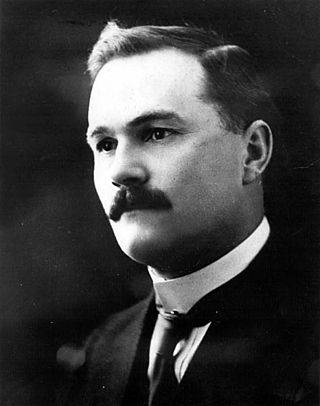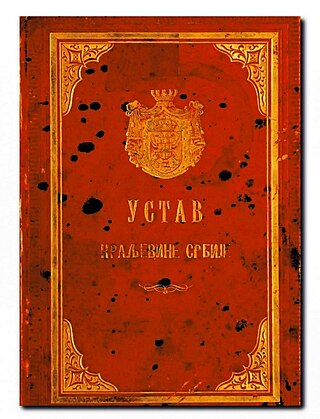 |
|---|
Parliamentary elections were held in Serbia on 22 June 1897 to elect members of the National Assembly.
 |
|---|
Parliamentary elections were held in Serbia on 22 June 1897 to elect members of the National Assembly.
A total of 191 members were elected, with a further 63 appointed. [1] The elections were boycotted by the Liberal Party, while the Serbian Progressive Party had dissolved itself prior to the elections. As a result, the People's Radical Party won all the seats. However, several members of the Liberals and Progressives were named amongst the appointees to the National Assembly. [1]
Nikola Pašić was appointed president of the National Assembly and Dimitrije Katić as vice president. [1]
The Radical Party's Đorđe Simić remained Prime Minister, but was dismissed by the king in October 1897 and replaced by Vladan Đorđević, who headed a cabinet whose members (with the exception of the Minister of War) were appointed by the king, largely composed of independents and Progressives, with a single Liberal. [2] On 14 March 1898 the Assembly was dissolved, with the intention of holding new elections. [1] A decree was issued on 18 April setting the election date as 23 May. [1]

The Bahamas is a parliamentary constitutional monarchy headed by King Charles III in his role as King of the Bahamas. The politics of The Bahamas takes place within a framework of parliamentary democracy, with a Prime Minister as the Head of Government. The Bahamas is an Independent Country and a member of the Commonwealth of Nations. As a former British colony, its political and legal traditions closely follow those of the United Kingdom. King Charles III is the head of state, but executive power is exercised by the cabinet. Legislative power is vested in the two chambers of parliament. The Judiciary is independent of the executive and the legislature and jurisprudence is based on English common law. The multi-party system is dominated by the Progressive Liberal Party and the Free National Movement. The constitution protects freedom of speech, press, worship, movement, and association.
The Progressive Party of Canada, formally the National Progressive Party, was a federal-level political party in Canada in the 1920s until 1930. It was linked with the provincial United Farmers parties in several provinces, and it spawned the Progressive Party of Saskatchewan, and the Progressive Party of Manitoba, which formed the government of that province. The Progressive Party was part of the farmers' political movement that included federal and provincial Progressive and United Farmers' parties.

Charles Avery Dunning was the third premier of Saskatchewan. Born in England, he emigrated to Canada at the age of 16. By the age of 36, he was premier. He had a successful career as a farmer, businessman, and politician, both provincially and federally.

The prime minister of Serbia, officially the President of the Government of the Republic of Serbia is the principal executive minister of the Government of Serbia. The prime minister directs the work of the government, and submits to the National Assembly the government's program, including a list of proposed ministers. The resignation of the prime minister results in the dismissal of the government.

The Politics of Serbia are defined by a unitary parliamentary framework that is defined by the Constitution of Serbia in which the president, currently Aleksandar Vučić, is the head of state while the prime minister, currently Ana Brnabić, is the head of government. Executive power is exercised by the Serbian government and the President of Serbia. Legislative power is vested in the unicameral National Assembly which is composed of 250 proportionally elected deputies. The judiciary is independent and is headed by the Supreme Court of Cassation, which is also the highest court in Serbia.

Milan Piroćanac was a Serbian jurist, politician, Prime Minister and the leader and founder of the Progressive Party.
The Yugoslav Democratic Party, State Party of Serbian, Croatian and Slovene Democrats and Democratic Party, also known as the Democratic Union was the name of a series of liberal political parties that existed in succession in the State of Slovenes, Croats and Serbs and the Kingdom of Serbs, Croats and Slovenes.

Jovan Avakumović was a Serbian lawyer, criminologist, statesman, and Prime Minister of Serbia.
Parliamentary elections were held in Serbia in early March 1893. Although the People's Radical Party had won a large majority in the 1889 elections, by 1893 a Liberal government led by Prime Minister Jovan Avakumović was in place.
Parliamentary elections were held in Serbia in April 1895. They followed a royal coup d'état by King Alexander in May 1894, in which he suspended the 1888 constitution and restored the 1869 constitution.
Parliamentary elections were held in Serbia on 12 December 1880 to elect members of the National Assembly. As expected, the elections resulted in a majority for the government, whose supporters won 94 seats, whilst Radicals won only 18 seats. By January 1881 the number of government supporters had risen to over 100, whilst the Radicals had split.
Senate elections were held in Serbia on 5 August 1901. They followed the promulgation of a new, liberal constitution in May, which created a bicameral People's Representative Body consisting of an elected National Assembly and a largely appointed Senate. The National Assembly had been elected in May 1901.

Aleksandar Martinović is a Serbian academic and politician who has served as minister of public administration and local self-government since 2022. He is a member of the Serbian Progressive Party (SNS) and led its parliamentary caucus from 2016 to 2022.
Dimitrije Katić was a Serbian economist, politician and president of the National Assembly. He is known for his concise and clear and evidence-based speeches.

The Constitution of the Kingdom of Serbia from 1888 was the fourth constitution of Serbia that was in use from 1889 to 1894. It was adopted by the Great National Assembly, at its session on January 2, 1889. In the Timok Rebellion of 1883, the conflict between the democratic aspirations of the masses and the absolutist aspirations of King Milan reached its climax. Numerous external and internal problems that called into question the future of the Obrenović dynasty on the throne forced the king to adopt that constitution.
Parliamentary elections were held in Serbia on 22 May 1901 to elect the members of the National Assembly. They were the first elections held under the 1901 constitution, which provided for a bicameral parliament consisting of a National Assembly and a Senate.
Parliamentary elections were held in Serbia on 23 May 1898 to elect members of the National Assembly. The result was a victory for the Liberal Party, which won 112 of the 194 seats.
Parliamentary elections were held in Serbia on 14 September 1890 to elect members of the National Assembly. The result was a landslide victory for the People's Radical Party.
Parliamentary elections were held in Serbia on 17 September 1887 to elect the 156 elected members of the National Assembly, with a further 52 appointed by the king.
Parliamentary elections were held in Serbia on 7 September 1883 to elect the elected members of the National Assembly. The result was a victory for the opposition People's Radical Party and Liberal Party, which together won 102 seats. The government led by Milan Piroćanac resigned, but King Milan I refused to allow the Radicals to form a government, instead appointing Nikola Hristić as prime minister.